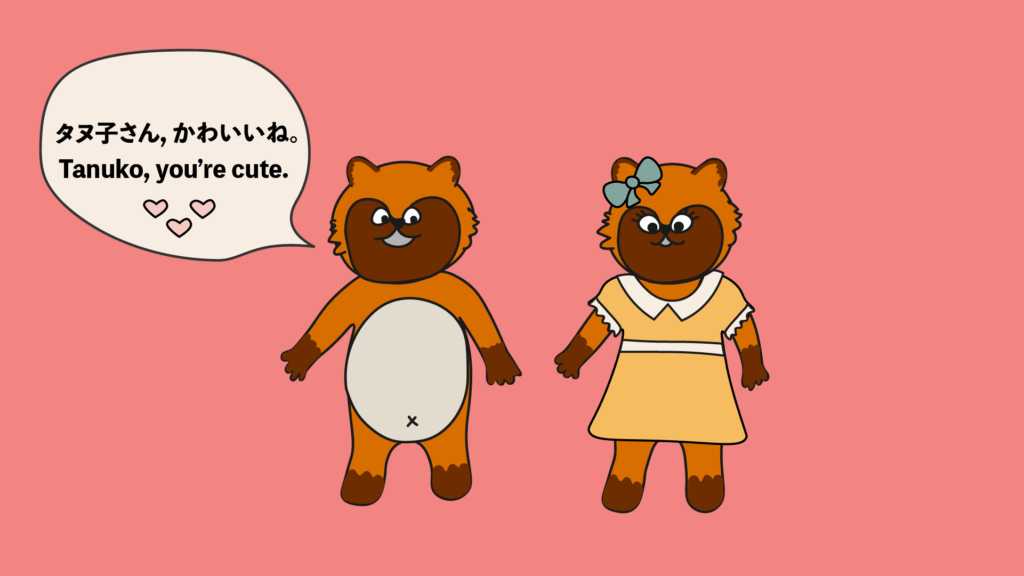How to compliment women in Japanese
As you’re learning Japanese, you might be interested in knowing how to compliment women in Japanese. Here is everything you need to know, from types of compliments and when to use them.
It’s important to keep in mind that Japanese culture is not extroverted. Special care should be taken to avoid awkwardness when complimenting!

Tanuki just met Tanuko who he finds cute! He’s very excited to express how he feels.
Complimenting women in Japanese culture
In Japan, people are not too forward with their feelings and thoughts. It might make someone uncomfortable if you suddenly tell them they’re extremely beautiful. When giving compliments it’s safer to stick to ones which have to do with personality and fashion style.
Here are the main things to remember on how to compliment women in Japanese:
- If you have romantic intentions, stick to fashion or personality compliments until you know the other person well.
- If you’re just good friends, you can say most compliments without any awkwardness.
Appearance Compliments
かわいい – kawaii – cute
Kawaii is one of the most well known words in Japan, with a huge culture built on it. You can use this compliment for women who look “cute”. Make sure not to confuse this word with kowai meaning “scary”!
タヌ子さん、かわいいね。
Tanuko san, kawaii ne.
Tanuko, you’re cute.
Another way to use kawaii, is to compliment clothing items, accessories, hairstyles, and more.
タヌ子さん、リボンがかわいいね。
Tanuko san, ribon ga kawaii ne.
Tanuko, your ribbon is cute.
きれい – kirei – pretty
Another great compliment towards women is the word kirei, meaning “pretty”. If you feel someone looks pretty you can use this one. In general, it’s better to describe women over 30 with this word. It has a more mature connotation than kawaii.
タヌ子さん、きれい!
Tanuko san, kirei!
Tanuko, you’re pretty!
With kirei, it’s especially common to compliment body parts like hands, eyes, skin, hair, and nails.
タヌ子さんの目はきれい。
Tanuko san no me wa kirei.
Tanuko’s eyes are pretty.
美しい – utsukushii – beautiful
This word works similarly to kirei, but it has a much stronger meaning. If someone is extremely beautiful you could use this word. Rather than for people, it’s more common to use this to describe body parts.
タヌ子さんの手は美しいね。
Tanuko san no te wa utsukushii ne.
Tanuko’s hands are beautiful.
美人 – bijin – beautiful person (beautiful)
This word means someone who is a “beauty”. In Japan, “beauty” is usually associated with women, so this one is mainly for women.
今日のタヌ子さん、美人!
Kyou no tanuko san, bijin!
You look beautiful today, Tanuko!
If you want to describe someone fashionable, you can use oshare. This could apply to a friend who is always wearing trendy clothes, and changing their hairstyle!
今日のタヌ子さん、オシャレ!
Kyou no tanuko san, oshare!
You look fashionable today, Tanuko!
You can also use this word for clothing items, accessories, or nails. This one doesn’t work with body parts!
タヌ子さんのリボンはオシャレ!
Tanuko san no ribon wa oshare!
Tanuko’s ribbon is fashionable!
スタイルがいい – sutairu ga ii – stylish
This phrase can be used to describe a person who has a stylish look (based on body appearance and fashion). Unlike other words, it doesn’t really work on clothes, body parts, or accessories.
タヌ子さん、スタイルがいい!
Tanuko san, sutairu ga ii!
Tanuko, you’re so stylish!
カッコいい – kakko ii – cool
This word is usually associated with men, but it can also be a compliment towards women. If someone has a “cool” and “boyish” vibe, you could use this phrase.
タヌ子さん、カッコいい!
Tanuko san, kakkoii!
Tanuko, you’re cool!
It also works when describing clothing items and hairstyles. A “cool” looking hair cut can be complimented with this phrase.
今日のタヌ子さんの髪型カッコいい!
Kyou no tanuko san no kamigata kakkoii!
Your hairstyle looks cool today, Tanuko!
すてき – suteki – lovely
This is a nice word you can use towards someone who is a wonderful woman with admirable qualities.
タヌ子さん、すてき!
Tanuko san, suteki!
Tanuko, you’re lovely!
It’s also possible to use this with clothing items and accessories.
タヌ子さんのドレスはすてき!
Tanuko san no doresu wa suteki!
Tanuko’s dress is lovely!
上品 – jouhin – classy
Someone who is classy with nice manners could be described by this word.
タヌ子さんは上品!
Tanuko san wa jouhin!
Tanuko, you’re classy!
This word is often used with high quality clothing and accessories.
タヌ子さんのリボンは上品。
Tanuko san no ribon wa jouhin.
Tanuko’s ribbon is classy.
似合ってる – niatteru – looks good on you
You can also compliment a woman by telling them that something looks good on them.
そのドレス似合ってる。
Sono doresu niatteru.
That dress looks good on you.
その髪型似合ってるね。
Sono kamigata niatteru.
That hairstyle looks good on you.
Personality Compliments
料理上手 – ryouri jouzu – good at cooking
Being good at cooking is seen as a good quality for women in Japan. This is a nice way to compliment someone’s cooking!
タヌ子さんは料理上手。
Tanuko san wa ryouri jouzu.
Tanuko is good at cooking.
気が利く – ki ga kiku – thoughtful personality
Being thoughtful is considered attractive in Japan. This means that a woman enjoys doing things for others. For example, you would clean the dishes when you’re invited to someone’s house without being asked.
タヌ子さんは気が利く。
Tanuko san wa ki ga kiku.
Tanuko is thoughtful.
しっかりしてる – shikkari shiteru – strong and independent
Especially in the past, there was an idea in Japan that women are not strong and tend to rely on others. This is why it can be a compliment to tell a woman that they are strong and independent.
タヌ子さんはしっかりしてる。
Tanuko san wa shikkari shiteru.
Tanuko is strong and independent.
優しい – yasashii – kind
Being kind is another quality that Japanese people think is attractive in women. You can compliment someone’s kindness with this phrase.
タヌ子さんは優しい。
Tanuko san wa yasashii.
Tanuko is kind.
親切 – shinsetsu – caring
This word can be used similarly to yasashii. It means that you are able to do things for others.
タヌ子さんは親切。
Tanuko san wa shinsetsu.
Tanuko san is caring.
How to make compliments stronger:
すごく/とても – sugoku/totemo – very
These two words can be used interchangeably to mean “very”. You can make compliments stronger by adding this word.
タヌ子さんはすごく優しい。
Tanuko san wa sugoku yasashii desu.
Tanuko is very kind.
タヌ子さんはとても美人。
Tanuko san wa totemo bijin.
Tanuko is very beautiful.
世界で一番 – sekai de ichiban – Most in the world
Use this phrase to make compliments extra strong. This means that they are “number one in the world” for that compliment!
タヌ子さんは世界で一番かわいい。
Tanuko san wa sekai de ichiban kawaii.
Tanuko is the cutest in the world.
Sentence structures for using compliments:
In the previous examples, I used Tanuko-san (Tanuki’s new female friend) as the main subject. If you want to use these phrases towards others it’s important to know the basic structure. In Japanese, it’s more common to use someone’s name instead of saying “you”. That’s why the phrases with Tanuko-san include her name even when it is directed at her.
For example, you can say “You are cute” in Japanese in the following ways:
あなたはかわいい。
Anata wa kawaii.
You are cute.
(person’s name)はかわいい。
(person’s name) wa kawaii.
You’re cute, (person’s name).
Using “anata” as a “you”, is less common and less polite than when you use it with the person’s name.
I hope that this article will help you understand how to compliment women in Japanese! Japanese culture is introverted. Take care with how you use compliments! If you’re interested in other Japanese language content feel free to check out my other articles: How to Introduce Yourself in Japanese or How to say goodbye in Japanese: Beyond sayounara
~Tanuki






Thank you for your explanation! 🙂
What would be a correct/ polite answer for a compliment? Or are you supposed to say nothing after?
Hi! A polite answer in Japanese would likely be something that denies the compliment, since Japanese people are extremely humble. So something like いいえ iie or そんなことないです。sonna koto nai desu. (that’s not true).
You can also accept the compliment, and that’s perfectly ok too! ありがとうございます。arigatou gozaimasu (thank you) or そんなふうに言われて嬉しいです。sonna fuu ni iwarete ureshii desu. (I feel happy you think that way). Hope that helps! I’ll probably post something about responses to compliments soon, since there are more ways to answer! ~Tanuki